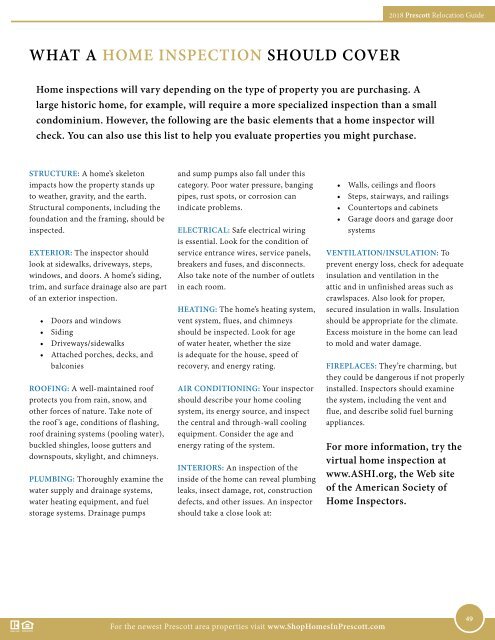2018 Prescott Relocation Guide -The Guedel Team
You also want an ePaper? Increase the reach of your titles
YUMPU automatically turns print PDFs into web optimized ePapers that Google loves.
<strong>2018</strong> <strong>Prescott</strong> <strong>Relocation</strong> <strong>Guide</strong><br />
WHAT A HOME INSPECTION SHOULD COVER<br />
Home inspections will vary depending on the type of property you are purchasing. A<br />
large historic home, for example, will require a more specialized inspection than a small<br />
condominium. However, the following are the basic elements that a home inspector will<br />
check. You can also use this list to help you evaluate properties you might purchase.<br />
STRUCTURE: A home’s skeleton<br />
impacts how the property stands up<br />
to weather, gravity, and the earth.<br />
Structural components, including the<br />
foundation and the framing, should be<br />
inspected.<br />
EXTERIOR: <strong>The</strong> inspector should<br />
look at sidewalks, driveways, steps,<br />
windows, and doors. A home’s siding,<br />
trim, and surface drainage also are part<br />
of an exterior inspection.<br />
• Doors and windows<br />
• Siding<br />
• Driveways/sidewalks<br />
• Attached porches, decks, and<br />
balconies<br />
ROOFING: A well-maintained roof<br />
protects you from rain, snow, and<br />
other forces of nature. Take note of<br />
the roof ’s age, conditions of flashing,<br />
roof draining systems (pooling water),<br />
buckled shingles, loose gutters and<br />
downspouts, skylight, and chimneys.<br />
PLUMBING: Thoroughly examine the<br />
water supply and drainage systems,<br />
water heating equipment, and fuel<br />
storage systems. Drainage pumps<br />
and sump pumps also fall under this<br />
category. Poor water pressure, banging<br />
pipes, rust spots, or corrosion can<br />
indicate problems.<br />
ELECTRICAL: Safe electrical wiring<br />
is essential. Look for the condition of<br />
service entrance wires, service panels,<br />
breakers and fuses, and disconnects.<br />
Also take note of the number of outlets<br />
in each room.<br />
HEATING: <strong>The</strong> home’s heating system,<br />
vent system, flues, and chimneys<br />
should be inspected. Look for age<br />
of water heater, whether the size<br />
is adequate for the house, speed of<br />
recovery, and energy rating.<br />
AIR CONDITIONING: Your inspector<br />
should describe your home cooling<br />
system, its energy source, and inspect<br />
the central and through-wall cooling<br />
equipment. Consider the age and<br />
energy rating of the system.<br />
INTERIORS: An inspection of the<br />
inside of the home can reveal plumbing<br />
leaks, insect damage, rot, construction<br />
defects, and other issues. An inspector<br />
should take a close look at:<br />
• Walls, ceilings and floors<br />
• Steps, stairways, and railings<br />
• Countertops and cabinets<br />
• Garage doors and garage door<br />
systems<br />
VENTILATION/INSULATION: To<br />
prevent energy loss, check for adequate<br />
insulation and ventilation in the<br />
attic and in unfinished areas such as<br />
crawlspaces. Also look for proper,<br />
secured insulation in walls. Insulation<br />
should be appropriate for the climate.<br />
Excess moisture in the home can lead<br />
to mold and water damage.<br />
FIREPLACES: <strong>The</strong>y’re charming, but<br />
they could be dangerous if not properly<br />
installed. Inspectors should examine<br />
the system, including the vent and<br />
flue, and describe solid fuel burning<br />
appliances.<br />
For more information, try the<br />
virtual home inspection at<br />
www.ASHI.org, the Web site<br />
of the American Society of<br />
Home Inspectors.<br />
For the newest <strong>Prescott</strong> area properties visit www.ShopHomesIn<strong>Prescott</strong>.com<br />
49



